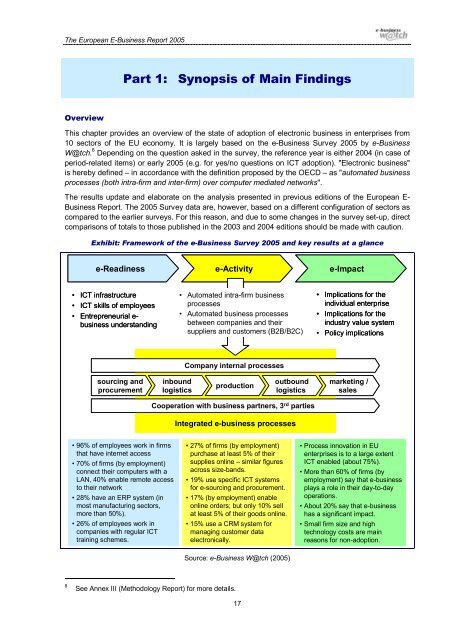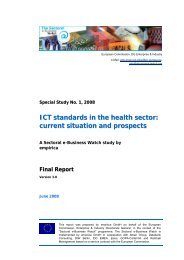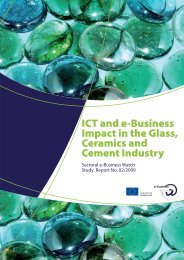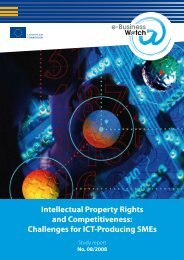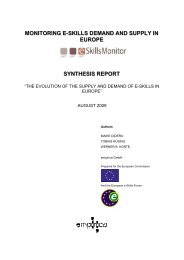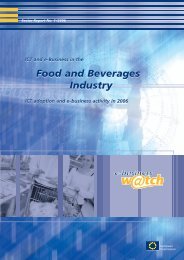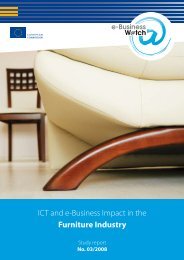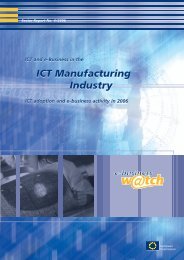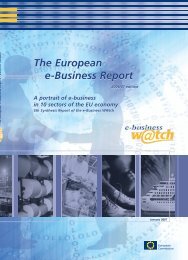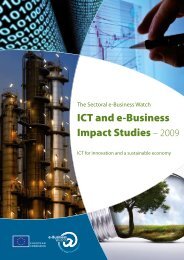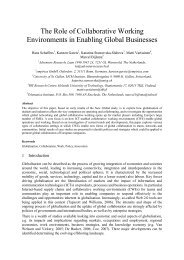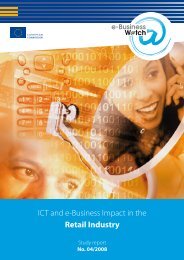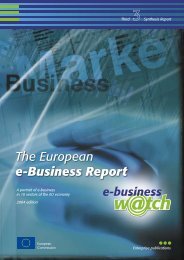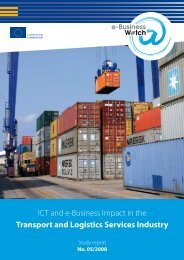The European e-Business Report The European e ... - empirica
The European e-Business Report The European e ... - empirica
The European e-Business Report The European e ... - empirica
Create successful ePaper yourself
Turn your PDF publications into a flip-book with our unique Google optimized e-Paper software.
<strong>The</strong> <strong>European</strong> E-<strong>Business</strong> <strong>Report</strong> 2005<br />
Part 1: Synopsis of Main Findings<br />
Overview<br />
This chapter provides an overview of the state of adoption of electronic business in enterprises from<br />
10 sectors of the EU economy. It is largely based on the e-<strong>Business</strong> Survey 2005 by e-<strong>Business</strong><br />
W@tch. 8 Depending on the question asked in the survey, the reference year is either 2004 (in case of<br />
period-related items) or early 2005 (e.g. for yes/no questions on ICT adoption). "Electronic business"<br />
is hereby defined – in accordance with the definition proposed by the OECD – as "automated business<br />
processes (both intra-firm and inter-firm) over computer mediated networks".<br />
<strong>The</strong> results update and elaborate on the analysis presented in previous editions of the <strong>European</strong> E-<br />
<strong>Business</strong> <strong>Report</strong>. <strong>The</strong> 2005 Survey data are, however, based on a different configuration of sectors as<br />
compared to the earlier surveys. For this reason, and due to some changes in the survey set-up, direct<br />
comparisons of totals to those published in the 2003 and 2004 editions should be made with caution.<br />
Exhibit: Framework of the e-<strong>Business</strong> Survey 2005 and key results at a glance<br />
e-Readiness e-Activity e-Impact<br />
• ICT infrastructure<br />
• ICT skills of employees<br />
• Entrepreneurial e-<br />
business understanding<br />
• Automated intra-firm business<br />
processes<br />
• Automated business processes<br />
between companies and their<br />
suppliers and customers (B2B/B2C)<br />
• Implications for the<br />
individual enterprise<br />
• Implications for the<br />
industry value system<br />
• Policy implications<br />
Company internal processes<br />
sourcing and<br />
procurement<br />
inbound<br />
logistics<br />
production<br />
outbound<br />
logistics<br />
marketing /<br />
sales<br />
Cooperation with business partners, 3 rd parties<br />
Integrated e-business processes<br />
•96% of employees work in firms<br />
that have internet access<br />
•70% of firms (by employment)<br />
connect their computers with a<br />
LAN, 40% enable remote access<br />
to their network<br />
•28% have an ERP system (in<br />
most manufacturing sectors,<br />
more than 50%).<br />
•26% of employees work in<br />
companies with regular ICT<br />
training schemes.<br />
•27% of firms (by employment)<br />
purchase at least 5% of their<br />
supplies online – similar figures<br />
across size-bands.<br />
•19% use specific ICT systems<br />
for e-sourcing and procurement.<br />
•17% (by employment) enable<br />
online orders; but only 10% sell<br />
at least 5% of their goods online.<br />
•15% use a CRM system for<br />
managing customer data<br />
electronically.<br />
Source: e-<strong>Business</strong> W@tch (2005)<br />
•Process innovation in EU<br />
enterprises is to a large extent<br />
ICT enabled (about 75%).<br />
•More than 60% of firms (by<br />
employment) say that e-business<br />
plays a role in their day-to-day<br />
operations.<br />
•About 20% say that e-business<br />
has a significant impact.<br />
•Small firm size and high<br />
technology costs are main<br />
reasons for non-adoption.<br />
8<br />
See Annex III (Methodology <strong>Report</strong>) for more details.<br />
17


